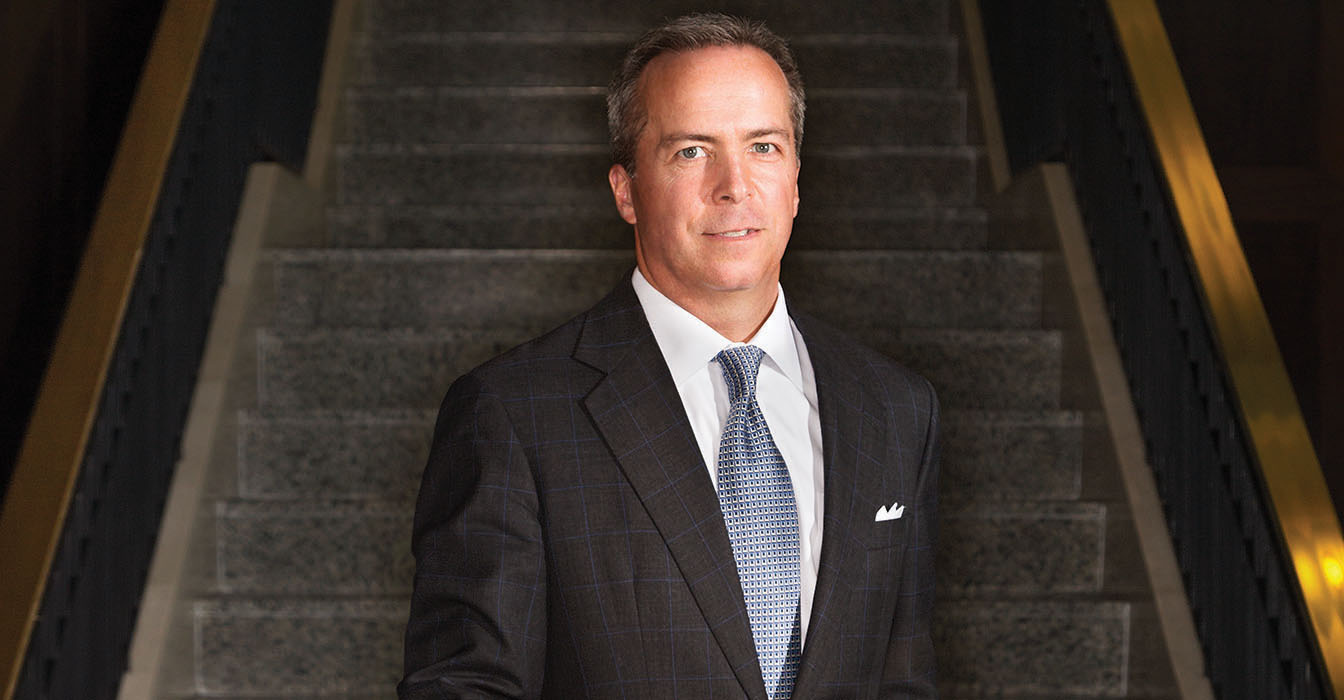Lawyer Limelight: William Dougherty
By Katrina Dewey | August 29, 2014 | Lawyer Limelights, Dealmakers

Photo by Greg Endries.
Bill Dougherty was selected as chairman of Simpson Thacher & Bartlett’s executive committee in 2013, succeeding Pete Ruegger, who was at the helm from 2004 to 2013. Dougherty embodies much of what has made the firm a distinctly collegial home for elite dealmakers and litigators. He is prone to talk more about his partners than himself, is deeply thoughtful about clients and their problems – and on top of it all, he’s a thoroughly nice guy.
Dougherty reflects on his experiences at Simpson Thacher and how they’ve prepared him to lead a firm of sophisticated lawyers who enjoy working closely with one another and clients on some of the biggest, most weighty matters in the world.
Lawdragon: Bill, let’s go back to when you were choosing what law firm to work at. What attracted you to Simpson Thacher?
William Dougherty: I really liked the place from the get-go. Law school was challenging, and I had spent my second year summer at two different firms. I decided to interview here as a third year, and I simply connected well with the people I met.
Many of the people that I started with are still my partners. There was an esprit de corps about the place and an “open-door” atmosphere about sharing knowledge and working cooperatively together. Everyone was very supportive of each other, and everyone worked very hard, but no one wore it on their sleeve. I liked that.
LD: What in your mind sets Simpson Thacher apart from a half-dozen other firms at the very most elite levels of law practice?
WD: It’s far from scientific, but we enjoy working with each other. I think clients sense that, believe they receive better service as a result, and appreciate that all of the resources of the firm will be made available to solve their issues. We recognize that we’re in a service business and it’s about listening to the clients, understanding what they want to achieve and then guiding them there.
And we’re very good at what we do. We know how our institutional clients operate, and as a result we can be stunningly efficient. We have deep expertise in our practice areas, we know the market and we understand what our clients want to achieve, and that gives us the ability to execute on their behalf. Our approach also tends to be pretty practical and straight-forward. We focus on getting results for our clients rather than promoting ourselves or our individual lawyers.
LD: Do you envision the firm working to grab more headlines?
WD: A lot of our clients make headlines and we don’t shy away from sharing that, but we also don’t foster a star culture either. We’d rather promote what the entire firm delivers together on behalf of our clients rather than highlighting individual achievements.
LD: When you became chairman did you view your role more as “if it ain’t broke, don’t fix it” or “we need to chart a new course”?
WD: More the former. We’ve got a great franchise, but we can strengthen it and we can’t be complacent. We take no relationship for granted. My generation has been gifted with incredible institutional relationships that we need to deepen and broaden constantly. We’re in a very good position right now, but we can always improve.
LD: In what ways would you like to see the firm strengthen or evolve?
WD: Historically, we’ve adapted well to changing markets and evolving clients, and I want to make sure we continue to do that.
We try to assess where demand is going to be and make sure we are positioned to meet it. In many cases, individual partners identify great opportunities. Dick Beattie and Bob Friedman identified the private equity opportunity at its inception in the 80s, and geared us to excel at it. Tom Bell pushed firm management to allow him to develop our fund formation practice and has made that group preeminent in the field, not just in the U.S. but internationally.
Greg Ressa transformed what had been a traditional lender-focused real estate practice into a private equity-focused real estate group. That is the kind of vision and adaptability we try to nurture here at all levels of the partnership. Our partners are continually assessing where the business of our clients is going and how we can meet their demands.
LD: What are some of the most important lessons you’ve brought to the role of chairman, whether from life or practice?
WD: I’ve had great mentors, Pete Ruegger in particular. Pete taught me this is a people business. A key part of my role is to help orchestrate the talent that is here – to facilitate our lawyers’ ability to deliver all the resources of the firm to our clients. For clients, it is about making sure we understand their legal needs and ensuring that we have or develop the resources to meet them so we can broaden and deepen our relationship with them.

